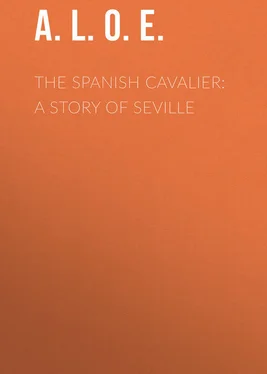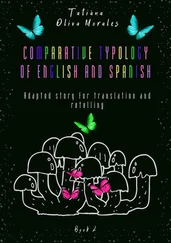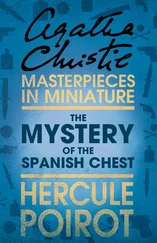A. L. O. E. - The Spanish Cavalier - A Story of Seville
Здесь есть возможность читать онлайн «A. L. O. E. - The Spanish Cavalier - A Story of Seville» — ознакомительный отрывок электронной книги совершенно бесплатно, а после прочтения отрывка купить полную версию. В некоторых случаях можно слушать аудио, скачать через торрент в формате fb2 и присутствует краткое содержание. Жанр: foreign_antique, foreign_prose, на английском языке. Описание произведения, (предисловие) а так же отзывы посетителей доступны на портале библиотеки ЛибКат.
- Название:The Spanish Cavalier: A Story of Seville
- Автор:
- Жанр:
- Год:неизвестен
- ISBN:нет данных
- Рейтинг книги:3 / 5. Голосов: 1
-
Избранное:Добавить в избранное
- Отзывы:
-
Ваша оценка:
- 60
- 1
- 2
- 3
- 4
- 5
The Spanish Cavalier: A Story of Seville: краткое содержание, описание и аннотация
Предлагаем к чтению аннотацию, описание, краткое содержание или предисловие (зависит от того, что написал сам автор книги «The Spanish Cavalier: A Story of Seville»). Если вы не нашли необходимую информацию о книге — напишите в комментариях, мы постараемся отыскать её.
The Spanish Cavalier: A Story of Seville — читать онлайн ознакомительный отрывок
Ниже представлен текст книги, разбитый по страницам. Система сохранения места последней прочитанной страницы, позволяет с удобством читать онлайн бесплатно книгу «The Spanish Cavalier: A Story of Seville», без необходимости каждый раз заново искать на чём Вы остановились. Поставьте закладку, и сможете в любой момент перейти на страницу, на которой закончили чтение.
Интервал:
Закладка:
"It's not the fish, but the price, that don't suit you," retorted the hawker. "Come, you shall have them a bargain, – let's say nine cuartos a pair."
"I'll give eight, and no more," cried the dame, eying the fish with a hungry look, but clinching hard the coppers which she held in her hand.
The hawker shook his head, and shouldered his basket.
"You'll lose the custom of the house," threatened the woman.
"No great loss," laughed the hawker, as he turned from the arch; "the barber round the corner will buy all this fish, and he earns enough with his razor to pay a fair price for his dinner!"
The torrent of abuse which the old dame launched after the retreating hawker, was suddenly stopped by the question of Lucius, —
"Is Don Alcala de Aguilera within?"
Old Teresa was startled and annoyed at the preceding colloquy having been overheard by a stranger. It was also wounding to her vanity as a woman, and her pride as a retainer of a noble family, that she should be seen in the deshabille in which she had emerged from the kitchen, instead of the black silk dress in which she was wont to attend Donna Inez to mass. In a tone of irritation Teresa replied that the illustrious caballero was not in the house.
"Is he likely soon to come in?" inquired Lucius Lepine.
The servant did not know, or chose not to tell. The caballero came in and out at his pleasure: he might be spending the evening at the governor's palace, he might not be home till midnight. Teresa stood in the middle of the archway like a jealous guardian of the place, who would suffer the entrance of no stranger to disturb its dignified seclusion. But the sound of Lepine's question had reached other ears than those of Teresa.
"Alcala, is it you at last?" exclaimed a sweet, eager voice from within; and Lucius caught a glimpse of a youthful form hurrying across the patio with a rapidity very unusual in the movements of a lady of Spain. It was indeed but a glimpse, for the donna, seeing that he at the entrance was a stranger and not her expected brother, instantly retreated, disappearing behind the foliage of the shrubs that surrounded the fountain.
The young Englishman would fain have sent in his card, and presented himself to the lady or ladies within, but shyness prevented his thus making an attempt to enter the house without a formal introduction. Lucius had seen little or nothing of society in the higher circles of Seville, and feared to give offence by some unintentional breach of its rules. The manner of Teresa would have shown a less intelligent observer than Lucius, that she at least would have resented and resisted as an intrusion any attempt on his part to venture within the archway. A little disappointed at his failure in procuring an interview with his friend, Lucius placed his card in the soiled, wrinkled hand of Teresa, to be given to her master on his return. With a lingering look through the vestibule into the beautiful patio beyond, the Englishman quitted the place.
In a state of high irritation, Teresa hurried through the passage into the court, taking care to close and lock the grating between them. With the air of a duenna who, having grown gray in service, thinks that she is privileged to say what she pleases, the old woman approached her young lady.
Donna Inez, on a low marble seat, was bending over the work on which she had been engaged when roused by hearing the voice of Lucius. The work was that of decorating some garment of the gayest description, – of bright green richly embroidered with silver, into which Inez was fastening spangles of the same brilliant metal. A scarf of the most vivid scarlet lay carelessly thrown across her knees. The gay colouring of the work on which she was employed contrasted with the black dress of the Spanish maiden; and she was pursuing her occupation with anything but pleasure, if one might judge from the gushing tears which ever and anon fell on her beautiful work.
"Donna Inez, Donna Inez! how could you do anything so unseemly?" exclaimed old Teresa, giving vent to her irritation. "What would the hidalgo Don Pedro de Aguilera have said, could he have seen his grand-daughter, without so much as a veil on her head, rushing towards an English stranger – a heretic, too! – with no more dignity than if she were some wandering gitána?"
Inez raised her tear-swollen eyes, and there was no lack of dignity in the tone of her gentle reply, "Methinks you forget your place, Teresa."
"Forget!" repeated the old woman angrily; "I should remember well enough, if I knew what is, or rather what is not , my place in this house. Am I not doctor, sick-nurse, and attendant to the old señora, and duenna to the young one; purveyor, keeper of stores, preparer of meals, anything and everything here, – helped by no one but bandy-legged Chico, who only serves the señor because no one else thinks him worth the puchero 5 5 A kind of soup, common in Spain
which he eats? Ah! it was very different, child, in your grandfather's days, before the hated French soldiers swarmed like wasps into Seville!"
Inez knew that poor old Teresa had entered on an inexhaustible theme when she began to speak of the good old days before the occupation of the city by the French in 1810. Teresa had been little more than a child when she had entered the service of Donna Benita de Aguilera, then a happy young wife and mother, but soon to be left a widow with wrecked fortune and shattered mind. Her husband, Don Pedro, a wealthy nobleman, and of the bluest blood in Spain, had joined the army raised to repel the invader. The tidings of De Aguilera's death in fight had reached his young wife at a time when French soldiers were quartered in her house. The shock had weakened the lady's intellect; and though she had lived on, was living on still in extreme old age, her subsequent life had been but as a lengthened childhood.
The family fortune had also at that time received a blow from which it had never recovered. Teresa was never weary of telling of the treasures which Don Pedro once had possessed, services of silver plate, and a splendid goblet of gold, and of the jewels of his bride, – which, by her account, might have purchased half Andalusia. Bitter were Teresa's invectives against the foreign robbers, who had not only killed her master, but plundered his helpless widow and orphan. Teresa had clung to the De Aguilera family in weal and in woe; but age and adversity had rendered more irritable a temper not naturally sweet; and having once dandled in her arms the father of Inez, the old duenna always looked on his daughter as a mere child. Teresa was as ready to chide as to serve the señorita; but the retainer's long-tried fidelity made Inez tolerate from her what from another she could not have borne.
Teresa now went rambling on with her reminiscences; but the mind of Inez was so painfully preoccupied, that she took in the meaning of nothing, and was only aware of the fact that the old woman was speaking, by the babble of her voice distressing an ear intently listening for the step of Alcala. The sun had sunk, and the first faintly visible star shone over the patio, which was unprovided with the awning commonly used in the courts of the wealthy to soften the glare of a southern sky. Inez could no longer see to work; but her labour was finished – the last silver spangle had been fixed on the glossy green satin sleeve. The maiden sat listening, waiting, weeping, till startled again by a sound at the entrance to the house, which made her spring to her feet with the exclamation, "It is my brother at last!"
CHAPTER IV.
PRIDE AND ITS PENALTY
But again Inez was disappointed. Instead of her brother appearing, Teresa ushered in a visitor, Donna Maria de Rivas, a middle-aged lady of Seville, well known to the Aguileras, as she had been brought up in the same convent as the late mother of Alcala and Inez.
Читать дальшеИнтервал:
Закладка:
Похожие книги на «The Spanish Cavalier: A Story of Seville»
Представляем Вашему вниманию похожие книги на «The Spanish Cavalier: A Story of Seville» списком для выбора. Мы отобрали схожую по названию и смыслу литературу в надежде предоставить читателям больше вариантов отыскать новые, интересные, ещё непрочитанные произведения.
Обсуждение, отзывы о книге «The Spanish Cavalier: A Story of Seville» и просто собственные мнения читателей. Оставьте ваши комментарии, напишите, что Вы думаете о произведении, его смысле или главных героях. Укажите что конкретно понравилось, а что нет, и почему Вы так считаете.












